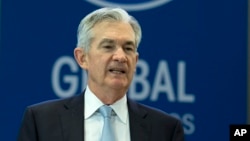Important interest rates in Europe and Japan have been negative for several years. The moves, however, could provide a warning about what happens when central banks’ efforts to support growth create problems instead.
That is the idea expressed last week by finance officials and others at the Reuters Global Investment Outlook 2020 Summit. They argue that the effects of below-zero interest rates are long-lasting and harmful.
Interest rates are negative when lenders – not borrowers – must pay interest.
Critics say negative rates punish people who save money, cause problems for big banks and lead people to take bigger risks to get a small amount of interest.
About $12.5 trillion of the world’s bonds, about 30 percent of the debt of countries in the developed world, pay negative interest. The Bank of Japan and the European Central Bank want economic growth and a small amount of inflation, so they have cut their interest rates to below zero.
However, a negative interest rate policy helps keep other interest rates, like the ones banks pay savers, low.
That means older people saving for retirement or in retirement are losing money, explained a recent blog post by BlackRock.
Blackrock and other investors say the U.S. Federal Reserve under Chairman Jerome Powell has been closely watching the situation in Europe and Japan. They say Powell wants to avoid negative rates in the United States.
“When you listen to Powell and other representatives of the Fed, they don’t want to takes rates negative,” said Dan Ivascyn. He is an investment officer at bond seller Pacific Investment Management Co.
“It will be well down the list of the tools that they will use,” he said.
The moves by Europe and Japan’s central banks have raised a question about what tools others, such as the U.S. Federal Reserve, have to fight a slowing economy.
The U.S. central bank last month cut its overnight lending rate by a fourth of a percentage point to a target somewhere between 1.5 percent and 1.75 percent.
U.S. President Donald Trump has suggested that the Federal Reserve push interest rates into negative numbers as a way to permit the U.S. government to refinance its $22 trillion in debt.
That is unlikely to happen, some of the financial experts at the meetings said.
“Never say never, but there is a real hesitancy here in the U.S. to take rates below (zero),” said Greg Peters. He is with the investment company, PGIM Fixed Income.
“I think the U.S. has had the benefit of seeing the (effects) of negative rates elsewhere,” he added.
Negative interest rates do not always lead to an increase in lending and growing business investment.
Negative rates can cause financial organizations to earn less. If their profits are affected they might stop lending altogether and that would hurt the economy.
Anne Mathias supervises investing at Vanguard. She is an expert in worldwide interest rates. She said negative interest rates are unlikely.
“If we go into a recession…we will just go back to quantitative easing and expand the balance sheet again,” she said.
Andrew Hsu is a manager of the DoubleLine Total Return Bond Fund. He warned about the effects of negative rates.
“If we had negative rates for the next 10-20 years... no one in this room will be able to retire,” he said.
I’m Susan Shand.
The Reuters News Agency reported this story. Susan Shand adapted it for VOA Learning English. Mario Ritter Jr. was the editor.
Write to us in the Comments Section or on our Facebook page.
________________________________________________________________
Words in This Story
negative – adj. less than zero
stimulus – n. putting money into an economy
bond – n. an official document in which a government or company promises to pay back an amount of money that it has borrowed and to pay interest for the borrowed money
refinance – v. to get a new loan to pay an older debt
hesitancy – n. slow to act or speak especially because you are nervous or unsure about what to d
quantitative easing – n. the introduction of new money into the money supply by a central bank.





